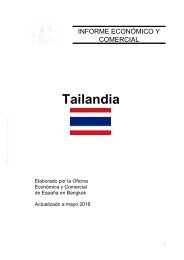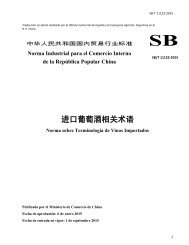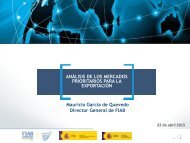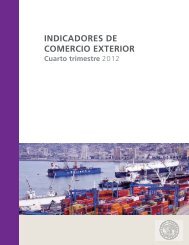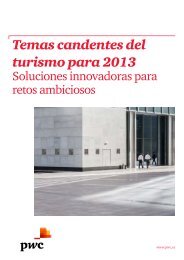Deep Shift Technology Tipping Points and Societal Impact
WEF_GAC15_Technological_Tipping_Points_report_2015
WEF_GAC15_Technological_Tipping_Points_report_2015
- No tags were found...
Create successful ePaper yourself
Turn your PDF publications into a flip-book with our unique Google optimized e-Paper software.
But the consequences of all this individual empowerment<br />
cannot be fully foreseen. The shifts entailed will not always<br />
be comfortable or easy. Already, for example, a sort of mob<br />
rule is sometimes developing, as consumer-driven social<br />
media amplifies issues <strong>and</strong> dem<strong>and</strong>s immediate resolution<br />
of problems <strong>and</strong> apparent injustices. Often this can have<br />
positive consequences, such as liberating a country<br />
from a dictator. However, it can also lead to uncertain,<br />
unreasonable <strong>and</strong> unstable results in systems at all levels of<br />
society. Regardless, our organizations <strong>and</strong> institutions need<br />
to anticipate <strong>and</strong> prepare for an increasingly empowered<br />
<strong>and</strong> engaged citizenry.<br />
<strong>Shift</strong>ing Ownership<br />
Ownership has always been an important factor of wealth,<br />
stability <strong>and</strong> power in society. In developed economies,<br />
graduates forsake mobility <strong>and</strong> took on large debts to get<br />
a foot on the property ladder, while around the world, the<br />
ownership of physical assets such as vehicles remains a<br />
solid symbol of status <strong>and</strong> independence. As far back as<br />
1755, Jean-Jacques Rousseau described the ownership<br />
of private property as the ultimate foundation of both civil<br />
society <strong>and</strong> inequality. 39<br />
past, living primarily from cash flow rather than from fixed<br />
assets <strong>and</strong> wealth.<br />
Yet, more flexibility can also imply less stability, <strong>and</strong> the<br />
move towards such an economy could leave workers<br />
vulnerable in the next downturn in employment. They might<br />
not be “too big to fail”, but less saving <strong>and</strong> asset ownership<br />
mean more dependence on regular work. In a society where<br />
short-term <strong>and</strong> zero-hour contracts are increasing, this<br />
could lead to an agile but fragile workforce.<br />
Similarly, on the more macro societal <strong>and</strong> economic<br />
level, these shifts should theoretically lead to a largescale<br />
overhaul of traditional organizational structures. Tax<br />
systems, pension schemes <strong>and</strong> trade unions will all have to<br />
be conceptually rethought or will become obsolete. Global<br />
inequality could be reduced <strong>and</strong> financial inclusion boosted<br />
by granting access to millions of citizens previously locked<br />
out of capital-based marketplaces. Shared access to 3D<br />
printing resources could provide a welcome boost to the<br />
environment by reducing dependence on large-factory<br />
employment in developing countries, <strong>and</strong> by reducing<br />
pollution <strong>and</strong> wastage in supply chains in developed nations.<br />
Of course, not only physical assets are concerned by<br />
ownership shifts. In a digital world, data <strong>and</strong> online presence<br />
are themselves assets, <strong>and</strong> the question of who owns them<br />
has already sparked legal battles <strong>and</strong> fierce competition<br />
between large online corporations as well as governments.<br />
Indeed, in a knowledge future where the concept <strong>and</strong><br />
measurement of “wealth” will need to be reassessed,<br />
<strong>and</strong> where connectivity <strong>and</strong> access will be prioritized over<br />
physical possession, perhaps the ownership of this data will<br />
measure the worth of a person or organization.<br />
This has shifted in recent years. The sharing or collaborative<br />
economy – loosely defined as the distribution <strong>and</strong> sharing<br />
of excess goods <strong>and</strong> services between individuals largely<br />
enabled by modern technology – has exp<strong>and</strong>ed to touch<br />
upon almost all aspects of society. Cars are pooled <strong>and</strong><br />
shared on Uber <strong>and</strong> Lyft, entertainment is rented rather than<br />
purchased on Spotify <strong>and</strong> Netflix, <strong>and</strong> even the home is<br />
periodically leased to ephemeral travellers on Airbnb. People<br />
are now more concerned with paying for access than with<br />
ownership, which has deep consequences for individuals,<br />
business, society <strong>and</strong> the economy.<br />
The advantages for individuals are abundant. Access to<br />
quality goods <strong>and</strong> services at highly competitive rates has<br />
been enhanced, with such products often available instantly<br />
through mobile booking. The ability to lease previously<br />
fixed assets such as cars opens up new, relatively informal<br />
avenues for generating income. Employment options have<br />
grown with working remotely <strong>and</strong> peer-to-peer task sharing<br />
of anything from translation to writing tenders. All of this has<br />
led to a more flexible form of economic life, which allows<br />
individuals to be more independent <strong>and</strong> flexible than in the<br />
<strong>Deep</strong> <strong>Shift</strong> - <strong>Technology</strong> <strong>Tipping</strong> <strong>Points</strong> <strong>and</strong> <strong>Societal</strong> <strong>Impact</strong><br />
37




